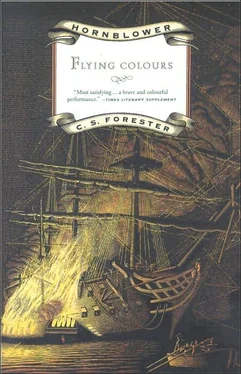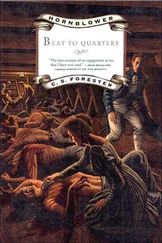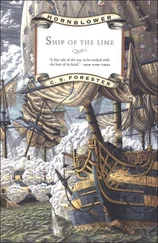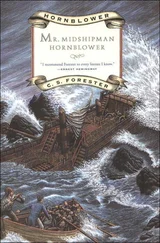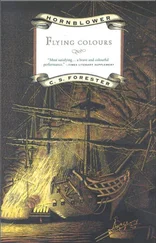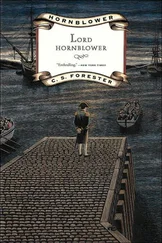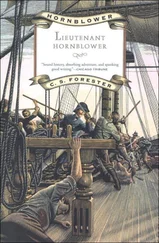Cecil Forester - Flying Colours
Здесь есть возможность читать онлайн «Cecil Forester - Flying Colours» весь текст электронной книги совершенно бесплатно (целиком полную версию без сокращений). В некоторых случаях можно слушать аудио, скачать через торрент в формате fb2 и присутствует краткое содержание. Год выпуска: 1989, ISBN: 1989, Издательство: Back Bay Books, Жанр: Исторические приключения, Путешествия и география, Морские приключения, на английском языке. Описание произведения, (предисловие) а так же отзывы посетителей доступны на портале библиотеки ЛибКат.
- Название:Flying Colours
- Автор:
- Издательство:Back Bay Books
- Жанр:
- Год:1989
- ISBN:0316289396
- Рейтинг книги:5 / 5. Голосов: 1
-
Избранное:Добавить в избранное
- Отзывы:
-
Ваша оценка:
- 100
- 1
- 2
- 3
- 4
- 5
Flying Colours: краткое содержание, описание и аннотация
Предлагаем к чтению аннотацию, описание, краткое содержание или предисловие (зависит от того, что написал сам автор книги «Flying Colours»). Если вы не нашли необходимую информацию о книге — напишите в комментариях, мы постараемся отыскать её.
Flying Colours — читать онлайн бесплатно полную книгу (весь текст) целиком
Ниже представлен текст книги, разбитый по страницам. Система сохранения места последней прочитанной страницы, позволяет с удобством читать онлайн бесплатно книгу «Flying Colours», без необходимости каждый раз заново искать на чём Вы остановились. Поставьте закладку, и сможете в любой момент перейти на страницу, на которой закончили чтение.
Интервал:
Закладка:
The new arrival, smartly enough handled, was edging in now to the quay. A backed topsail took the way off her, and the warps creaked round the bollards. Hornblower watched idly, Bush and Brown beside him. As the ship was made fast, a gang plank was thrown to the quay, and a little stout man made ready to walk down it from the ship. He was in civilian clothes, and he had a rosy round face with a ridiculous little black moustache with upturned ends. From his manner of shaking hands with the captain, and from the very broken English which he was speaking, Hornblower guessed him to be the pilot.
The pilot! In that moment a surge of ideas boiled up in Hornblower’s mind. It would be dark in less than an hour, with the moon in its first quarter—already he could see it, just visible in the sky high over the setting sun. A clear night, the tide about to ebb, a gentle breeze, southerly with a touch of east. A pilot available on the one hand, a crew on the other. Then he hesitated. The whole scheme was rash to the point of madness—beyond that point. It must be ill-digested, unsound. His mind raced madly through the scheme again, but even as it did so he was carried away by the wave of recklessness. There was an intoxication about throwing caution to the winds which he had forgotten since his boyhood. In the tense seconds which were all he had, while the pilot was descending the gang plank and approaching them along the quay, he had formed his resolution. He nudged his two companions, and then stepped forward and intercepted the fat little pilot as he walked briskly past them.
“Monsieur,” he said. “I have some questions to ask you. Will you kindly accompany me to my ship for a moment?”
The pilot noted the uniform, the star of the Legion of Honour, the assured manner.
“Why, certainly,” he said. His conscience was clear; he was guilty of no more than venal infringements of the Continental system. He turned and trotted alongside Hornblower. “You are a newcomer to this port, Colonel, I fancy?”
“I was transferred here yesterday from Amsterdam,” answered Hornblower shortly.
Brown was striding along at the pilot’s other elbow; Bush was bringing up the rear, gallantly trying to keep pace with them, his wooden leg thumping the pavement. They came up to the Witch of Endor, and made their way up her gang plank to her deck; the officer there looked at them with a little surprise. But he knew the pilot, and he knew the customs uniform.
“I want to examine one of your charts, if you please,” said Hornblower. “Will you show us the way to the cabin?”
The mate had not a suspicion in the world. He signed to his men to go on with their work and led the way down the brief companion to the after cabin. The mate entered, and politely Hornblower thrust the pilot in next, before him. It was a tiny cabin, but there was sufficient room to be safe when they were at the farther end. He stood by the door and brought out his two pistols.
“If you make a sound,” he said, and excitement rippled his lips into a snarl, “I will kill you.”
They simply stood and stared at him, but at last the pilot opened his mouth to speak—speech was irrepressible with him.
“Silence!” snapped Hornblower.
He moved far enough into the room to allow Brown and Bush to enter after him.
“Tie ‘em up,” he ordered.
Belts and handkerchiefs and scarves did the work efficiently enough; soon the two men were gagged and helpless, their hands tied behind them.
“Under the table with ‘em,” said Hornblower. “Now, be ready for the two hands when I bring ‘em down.”
He ran up on deck.
“Here, you two,” he snapped. “I’ve some questions to ask you. Come down with me.”
They put down their work and followed him meekly, to the cabin where Hornblower’s pistols frightened them into silence. Brown ran on deck for generous supply of line with which to bind them and to make the lashings of the other two more secure yet. Then he and Bush—neither of them had spoken as yet since the adventure began—looked to him for further orders.
“Watch ‘em,” said Hornblower. “I’ll be back in five minutes with a crew. There’ll be one more man at least to make fast.”
He went up to the quay again, and along to where the gangs of galley slaves were assembling, weary after their day’s work of unloading. The ten chained men under the sergeant whom he addressed looked at him with lack-lustre eyes, only wondering faintly what fresh misery this spruce colonel was bringing them.
“Sergeant,” he said. “Bring your party down to my ship. There is work for them there.”
“Yes, Colonel,” said the sergeant.
He rasped an order at the weary men, and they followed Hornblower down the quay. Their bare feet made no sound, but the chain which ran from waist to waist clashed rhythmically with their stride.
“Bring them down on to the deck,” said Hornblower. “Now come down into the cabin for your orders.”
It was all so easy, thanks to that uniform and star. Hornblower had to try hard not to laugh at the sergeant’s bewilderment as they disarmed him and tied him up. It took no more than a significant gesture with Hornblower’s pistol to make the sergeant indicate in which pocket was the key of the prisoners’ chain.
“I’ll have these men laid out under the table, if you please, Mr. Bush,” said Hornblower. “All except the pilot. I want him on deck.”
The sergeant and the mate and the two hands were laid out, none too gently, and Hornblower went out on deck while the others dragged the pilot after him; it was nearly quite dark now, with only the moon shining. The galley slaves were squatting listlessly on the hatchcoaming. Hornblower addressed them quietly. Despite his difficulty with the language, his boiling excitement conveyed itself to them.
“I can set you men free,” he said. “There will be an end of beatings and slavery if you will do what I order. I am an English officer, and I am going to sail this ship to England. Does anyone not want to come?”
There was a little sigh from the group; it was as if they could not believe they were hearing aright—probably they could not.
“In England,” went on Hornblower, “you will be rewarded. There will be a new life awaiting you.”
Now at last they were beginning to understand that they had not been brought on board the cutter for further toil, that there really was a chance of freedom.
“Yes, sir,” said a voice.
“I am going to unfasten your chain,” said Hornblower. “Remember this. There is to be no noise. Sit still until you are told what to do.”
He fumbled for the padlock in the dim light, unlocked it and snapped it open—it was pathetic, the automatic gesture with which the first man lifted his arms. He was accustomed to being locked and unlocked daily, like an animal. Hornblower set free each man in turn, and the chain clanked on the deck; he stood back with his hands on the butts of his pistols ready in case of trouble, but there was no sign of any. The men stood dazed—the transition from slavery to freedom had taken no more than three minutes.
Hornblower felt the movement of the cutter under his feet as the wind swung her; she was bumping gently against the fends-off hung between her and the quay. A glance over the side confirmed his conclusions—the tide had not yet begun to ebb. There were still some minutes to wait, and he turned to Brown, standing restless aft of the mainmast with the pilot sitting miserably at his feet.
“Brown,” he said quietly, “run down to our boat and bring me my parcel of clothes. Run along now—what are you waiting for?”
Brown went unhappily. It seemed dreadful to him that his captain should waste precious minutes over recovering his clothes, and should even trouble to think of them. But Hornblower was not as mad as he might appear. They could not start until the tide turned, and Brown might as well be employed fetching clothes as standing fidgeting. For once in his life Hornblower had no intention of posing before his subordinates. His head was clear despite his excitement.
Читать дальшеИнтервал:
Закладка:
Похожие книги на «Flying Colours»
Представляем Вашему вниманию похожие книги на «Flying Colours» списком для выбора. Мы отобрали схожую по названию и смыслу литературу в надежде предоставить читателям больше вариантов отыскать новые, интересные, ещё непрочитанные произведения.
Обсуждение, отзывы о книге «Flying Colours» и просто собственные мнения читателей. Оставьте ваши комментарии, напишите, что Вы думаете о произведении, его смысле или главных героях. Укажите что конкретно понравилось, а что нет, и почему Вы так считаете.
